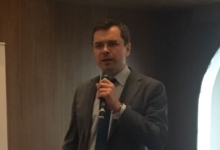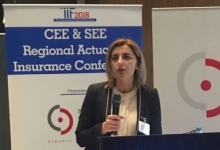 Industry professionals from CEE gathered on 22 February, in Macedonia, at the "IIF 2018 - CEE & SEE - Regional Actuarial Insurance Conference", to analyze the current reality of the actuarial job.
Industry professionals from CEE gathered on 22 February, in Macedonia, at the "IIF 2018 - CEE & SEE - Regional Actuarial Insurance Conference", to analyze the current reality of the actuarial job.The conference brought into debate important topics focusing on:
- The importance of actuarial capacity for effective insurance supervision
- Actuarial issues in a volatile economic context - impact of the macroeconomic "movements" upon the insurance business
- The importance of actuarial profession for the development of the insurance industry
- The actuary's place between risks, management decisions - are actuarial skills enough put to works in the CEE insurance industry?
- The talent hunting - where do find the CEE insurers the actuarial talents they need?
- Prof. Karel Van HULLE, KU Leuven and Goethe University Frankfurt
- Klime POPOSKI, President, Insurance Supervision Agency, Macedonia
- Peter BRAUMULLER, Managing Director, FMA - Financial Market Authority, Austria
- Bostjan VOVK, Deputy President, Insurance Supervision Agency, Slovenia
- Alexandra SMEDOIU, Member of the Board CFA Romania
- Maria KAMENAROVA, Manager of Risk and Actuarial Department, NN Insurance, Slovakia, Vicepresident, Slovak Society of Actuaries, Member of Board of AAE - Actuarial Association of Europe
- Renata De LEERS, Executive Director, Actuaries Without Borders, IAA Section & Consulting Actuary IA/BE
- Rudi LIPOVEC, Head of Actuarial Department, TRIGLAV, Slovenia
- Florentina ALMAJANU, Member of the Board, ISF - Institute for Financial Studies Romania
- Octavian COSENCO, Vicepresident, ARA - Romanian Actuaries Association
- Vladimir BUBALOV, President, Macedonian Actuarial Association
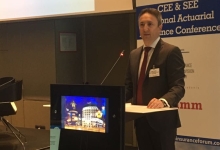 Klime POPOSKI, President, Insurance Supervision Agency, Macedonia
Klime POPOSKI, President, Insurance Supervision Agency, Macedonia- Our objectives with the CEE & SEE Regional Actuarial Insurance Conference is to develop the actuarial capacity not only in Macedonia, but within the Region
- This event represents the beginning of a new page in the history for the actuarial profession in the region as it will be organised yearly.
- Regarding the actuarial profession in Macedonia, one can note that in 2010, out of 13 existing insurance companies, 9 of them shared the same actuary. T.he general perception about actuaries was very weak, at this profession was considered a regulatory imposed burden and that they were involved only in the reserving process, sometimes even "against the best interest of the company, reducing the profits".
- The establishment of ISA-Insurance Supervision Agency was a crucial step in the development of this profession, due to the regulatory framework (education standards. rules of the profession, imposing penalties and revoking the licences for actuaries) and due to supervisory activities and measures.
- Currently, in Macedonia we have 32 actuaries, out of which 29 are Qualified Actuaries. Actuaries are involved not only in provisioning, but also in other areas of operations. We are happy with out achievements but we will continue to support the development and involvement of the actuaries in the risk management and decision-making process, especially since we are preparing for the Solvency II implementation in the country and to liberalise the MTPL tariffs.
- We are really proud with the work of the Macedonian actuaries.
- The average number of actuaries per insurance companies in the Western Balcans countries ranges between 0,7-3,5. But what we need for these Balcans countries is a harmonises regulatory framework for actuarial education and licensing and a Regional Center that could be in charge of education, in collecting the data for statistical purposes while conducting research at the same time. I would like to promote this idea - maybe Macedonia and Skopje can be the hosts of this hub.
 Prof. Karel Van HULLE, KU Leuven and Goethe University Frankfurt
Prof. Karel Van HULLE, KU Leuven and Goethe University Frankfurt- Can an insurer operate without actuarial support? Can a regulator do it? These are key questions that underline the capabilities of the actuarial profession
- In fact, the actuarial function is a key governance function under Solvency II. The Directive puts the actuarial profession on the map.
- Solvency II recognises the actuarial function as par of the new governance requirements in Pillar 2. Also, the risk-based solvency regime has two capital requirements: SCR and MCR, not no mention ORSA, the market consistent valuation of assets and liabilities, the internal models etc. It is the paradise for actuaries.
- However, in practice, the person in charge of the actuarial function is not a number function but has executive responsibilities as many important decision in the undertaking cannot take place without prior input from the actuarial function.
- At some stage, in the vision of Solvency II, EIOPA will at some point develop European standards
- One can expect a continuous increase in the demand for persons with actuarial skills in (re)insurance undertakings, supervisory agencies, banks and other financial institutions.
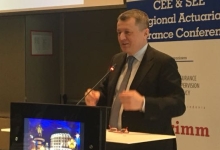 Peter BRAUMULLER, Managing Director, FMA-Financial Market Authority, Austria
Peter BRAUMULLER, Managing Director, FMA-Financial Market Authority, Austria- The insurance world is changing fast. Big Data and the increasing amount of available data brings new challenges, as products get increasingly complex, more individualised while investment-type products tend to also become more complex
- The role of actuaries within supervisory authorities has increased over the years due to several factors, including the increased complexity of solvency calculations, internal models etc. But it is hard for supervisors to keep pace with the increasing complexity in business models and products as well as the fast changing risk environment
- On the international stage, there are several initiatives aiming at strengthening the actuarial capacity in supervisory authorities: the IAA-IAIS-A2ii Partnership Agreement - signed in November 2017 that focuses on emerging markets and the Pilot Project on Capacity Building: Chongli Supervisory Capacity Building Programme (IAIS and IAA)
- In order to allow proper observance of ICPs in practice, there are certain preconditions for effective insurance supervision that need to be met such as the availability of skilled, competent, independent and experienced actuaries
- In conclusion, the IAIS ICPs consider adequate actuarial capacities as a precondition for standards observance. On the same note, the proportionality principle allows less developed markets to take account of their specific circumstances.
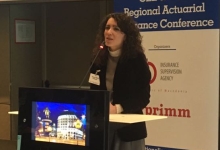 Alexandra SMEDOIU, Vicepresident, CFA Romania
Alexandra SMEDOIU, Vicepresident, CFA Romania- The CEE insurance markets are mostly still based on non-life products. Slovenia stands out from the cohort from many points of view.
- The industry's regulatory landscape in changing: Solvency II, IDD, GDPR etc. and this is affecting non-EU countries such as Macedonia nevertheless.
- Only one of the Solvency II Pillars is actually based on figures (Pillar I), while the others relate to Governance framework (Pillar II) and Disclosure requirements (Pillar III)
- In terms of the Romanian Solvency II experience - the Directive is applicable staring January 2016 and, although it was challenging, the market got the job done. The biggest challenge was how to define the contractual boundaries, or in case of non life the right to unilaterally terminate the contract.
- Solvency II also brought several opportunities, such as a better capital allocation, a more efficient decision-making process (as risk becomes an explicit price component and more sets of data are now available) while at the same time leading to a consolidation of the market.
- Overall, the industry changed a lot over the years, with a high pace of change
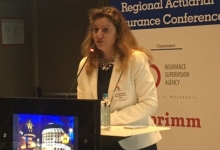 Maria KAMENAROVA, Member of the Board, Actuarial Association of Europe
Maria KAMENAROVA, Member of the Board, Actuarial Association of Europe- AAE-Actuarial Association of Europe was established in 1978 but it was known previously as Groupe Consultatif. The organisation represented actuarial associations of Europe. The AAE currently has 36 member associations in 35 European countries, representing over 22.000 actuaries.
- The Association's vision is that actuaries throughout Europe are recognized as the leading quantitative professional advisers in financial services, risk management and social protection. At the same time, beside other activities, the AAE promotes professionalism, consistent standards for education among actuaries in Europe
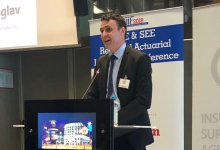 Rudi LIPOVEC, Head of Actuarial Department, TRIGLAV, Slovenia
Rudi LIPOVEC, Head of Actuarial Department, TRIGLAV, Slovenia- Insurers have to make profit, event out of natural catastrophes - otherwise the whole system will not function
- The impact of natural disaster does not depend only on nature but also on the resilience of people.
- Natural catastrophes are defined as events that impact a huge number of policies, even though the severity of each individual claim is not necessarily extremely high. In example. mega events can pass without attracting big attention, in areas with a low density of population or with a low insurance penetration.
- The UN World Risk Index for catastrophes (which is based on 28 indicators) gives a picture of the countries vulnerabilities and exposure to natural hazards. Over the last 40 years, storms and floods-related losses have increased significantly
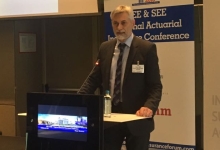 Bostjan VOVK, Deputy Director, Insurance Supervision Agency, Slovenia
Bostjan VOVK, Deputy Director, Insurance Supervision Agency, Slovenia- The perception of actuaries has to improve, as they apply unique skills and a professional approach to solving complex problems, advising on future risks, opportunities and options, across diverse field and industries
- In fact, actuarial advice is not a compliance exercise nor a technical process. Instead, actuaries are a trusted source of advice and expertise
- Looking at the opportunities, we should promote ourselves, the actuaries, as professionals that have a holistic understanding of the insurance business (the risks, the insurance contracts and the balance sheet).
- The first challenge is the development of the actuarial profession so that services can be better delivered. Also, development of supervisors so that actuarial services can be better used is of high importance.
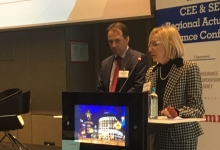 Renata De LEERS, Executive Directive, Actuaries Without Borders, IAA Section & Consulting Actuary IA/BE
Renata De LEERS, Executive Directive, Actuaries Without Borders, IAA Section & Consulting Actuary IA/BE- The IAA-International Actuarial Association was created in 1895 in Belgium as a non-profit NGO with 72 full member organisations, 29 associate members and a number of key institutional members such as IASB, OECD, ISSA, IOPS and ILO. Among other activities, the IAA offers advice and assistance, is involved in publications and webinars and also organised regional seminars.
- There are certain difference between emerging and developing markets in terms of the nature of insurance risks, level of uncertainty, governance and risk management practices, regulatory regimes, depth of investment markets and available skills
- For an actuary, working in emerging and developing markets means more uncertainty, risk and more opportunity but also a stronger need for actuarial competencies
- Actuarial Associations from developing economies attained the status of IAA Members after 2010 (Albania, Bosnia, Macedonia and Serbia) while EU member states have done so beforehand
- Actuarial skills are not limited, as per the popular perception, to technical and compliance skills. This need to be understood by insurance organisations and beyond
- Actually, in the CEE & SEE markets one can write actuarial history!
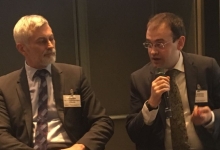 Hayk ZAYIMTSYAN, Council of Bureau, Armenia
Hayk ZAYIMTSYAN, Council of Bureau, Armenia- The role of actuaries is even heightened in emerging and developing economies
- In such countries, a large portion of the GWP comes from MTPL insurance, so in that sense the actuarial input into making the business viable is extremely important
- Good product design and good pricing are becoming more and more important given the low-yield environment (as undertakings can not compensate underwriting losses with investment income) - hence the increased role of actuaries
- As soon as MTPL markets are liberalised the business wants to attract market share. Here come the role of actuaries.
- For the beginning I would like to present the Romanian Institute of Financial Studies, which has achieved good performances over the years: 100 programs; more than 20.000 participants; 5 national centers; 200 trainers; 96.200 certifications.
- ISF's vision: Center of excellence in financial education programs aiming at insuring adequate levels of professional competencies for the financial institutions' employees in Romania.
- Among the projects of the Institute in 2017, I would like to highlight the MASTER Program of Actuarial Techniques - TACT.
- Before 2000 there were few foreign actuaries and students (to the Institute and Faculty of Actuaries from UK) on Romanian Insurance Market. Later on, in 2000 and in 2005, the legislation regulated the requirements and the objectives for the profession of actuary.
- Initially, in order to become a qualified actuary, on a short term, the solution was attending the University of Budapest. Later, the efforts made by the Insurance Industry succeeded in finding an answer to the local need on medium and long term. The result is this Master Program of Actuarial Techniques, called TACT
- A few words about our Master Program of Actuarial Techniques - TACT:
- Since 2005 Master TACT has been organized as a partnership between the Institute of Financial Studies and the Bucharest University of Economic Studies;
- In 2008 was approved by The Romanian Agency for Quality Assurance in Higher Education as the Risk Management and Actuarial Techniques master program which has two specialties;
- In 2013 was approved for the second time by The Romanian Agency for Quality Assurance in Higher Education as the Actuarial Techniques master program;
- Graduated 436 Master students.
- The Key Elements of Master TACT:
- Professors from 3 Romanian Universities;
- The Professionals who were invited as lecturing guests from the Insurance Industry represented around 35% of the professors;
- Master program is supported by the Romanian Actuarial Association;
- Tutorial sessions presented by guests from Portugal, Austria, Germany.
- Taking into account all the above mentioned efforts of the Insurance Industry and Academic Representatives resulted in:
- 2013 - The opening of a local branch of Allianz - AMOS/Allianz Technology, Bucharest Branch - 60 actuaries in 2018;
- 2015 - Actuaries Registry was transferred from Financial Supervisory Authority to The Romanian Actuarial Association;
- 2018 - The Romanian Actuarial Association - 238 members;
- 2017 - 2019 MASTER TACT creates a new generation of actuaries - 20 people;
- 2018 - Plans for 2018 include: a) new partneships for internships, b) developing a workgroup with potential employers, c) updating the curriculum, d) applying for accreditation from Institute and Faculty of Actuaries UK.
- The most important fact is the "birth" of Master Program TACT which has already registered 436 graduates and a new generation of 20 people will fill in the demand of the actuary community.
- Soft skills are very important for an actuary, much more important than in the past. One needs to know how to transfer the knowledge, to communicate to al stakeholders
- My message towards actuaries is that you have to be more involved into building your associations and in setting-up the rules that you associations have to follow
- It is extremely demanding to build an association but this is something that should be done by all of us as in the future will bring more value to the insurance companies than we can now imagine
- In Albania, several laws have been passed requiring the professional skills of actuaries, in order to certify the appropriateness of insurance products, the adequacy of the reserves for their technical liabilities and the undertakings solvency
- The Albanian Association of Actuaries was created in September 2008. It has certified the first 22 actuaries in Albania in the first two dedicated programs
- The FSA has several educational programs, including an Educational Centre. It is now ready to start a new program for the training of actuaries
- Overall we can see an increased interest for the actuarial professional.
7470 views



